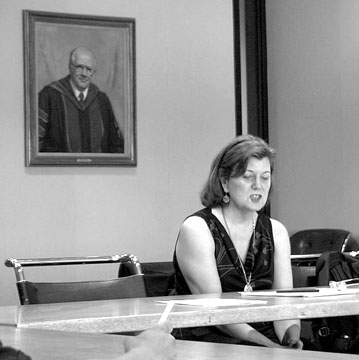The UMass Boston community recently had the opportunity to attend a lecture by Randall Forsberg.
Forsberg is well known for her anti-war efforts, which included a write-in campaign preceding the fall 2002 Senate elections in protest to John Kerry’s support of the war in Iraq. During her distinguished career, Forsberg has worked with President William Clinton, published books and journals, and been the recipient of the McArthur Fellowship. Forsberg’s goal has been to educate the public on alternatives to war, as well as on particular countries, such as North Korea, which are portrayed as threats to security.
“I am truly horrified at what Bush has done [to] civil liberties, women’s rights, and the environment,” Forsberg began her lecture Wednesday. She then proceeded to provide examples of steps the government has taken to alienate the United Nations and other countries.
Forsberg charged the alienation began with the rejection of a proposed international treaty to ban all nuclear testing, because the U.S. wants to retain the right to continue underground nuclear testing. This refusal to participate in the treaty has already had negative consequences. The treaty, which was proposed in 1996, could have been ratified by 1997 with U.S. approval, and thereby would have prevented Pakistan and India from testing nuclear weapons in 1998, she said. She added that the rejection of this treaty is just one example of the U.S. refusing to cooperate with world leaders in an effort to promote peace.
According to Forsberg, the U.S. government has also proved unaccommodating in efforts to promote peace in its current relations with North Korea. She went on to explain that under the Clinton administration, North Korea had agreed to end testing and exportation of missiles in a span of ten to fifteen years. It is important to note the aforementioned weapons produced by North Korea were all legal. In return for halting production of these weapons, the U.S. government had agreed to compensate North Korea for the financial loss it would experience, provide two communications satellites, and recognize North Korea diplomatically by removing the country from the list of terrorist support countries.
Forsberg then went on to explain how the plan, which had already been agreed upon and suited the needs of both countries, was rejected by the Bush administration. According to Forsberg, President Bush demanded that North Korea not only stop producing new weapons, but destroy all existing weapons, permit onsite inspections, pull troops away from the border of South Korea, and practice human rights policies. The Bush administration also stipulated that North Korea would not be diplomatically recognized for these actions, nor would it receive any monetary compensation previously promised. Forsberg summed the policy up as “disarm first, talk later.”
Anther example of U.S. disregard of previously agreed upon policy is the war against Iraq. The war is in violation of a UN treaty which states that a country may only wage war if protecting itself or an ally. It is against international law to overthrow a government because it is considered oppressive, one of the reasons the U.S. currently cites for waging war.
Forsberg’s presentation was not completely pessimistic. She noted that the protests against the war were the first in history to take place prior to the beginning of a war. Also, she mentioned the website www.urgentcall.org for those interested in volunteering for a campaign to educate the voting population on foreign policy. Those interested in this can visit her website, or call 617-354-4337.
The event, held in the Chancellor’s Conference Room, was sponsored by UMass Boston’s Joiner Center, and was intended to inform the community of alternatives to war, including options to avoid war.





















































